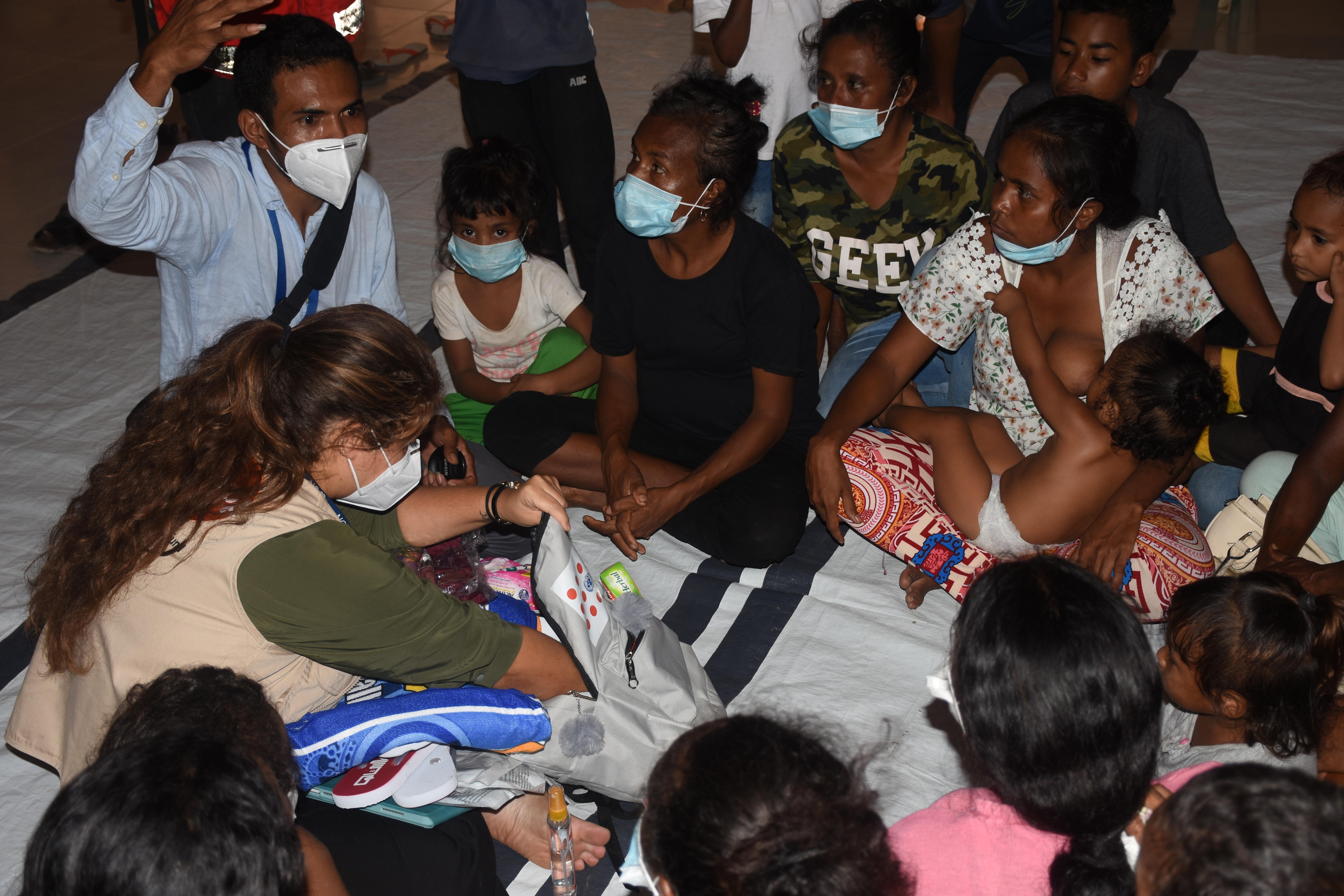DILI April 08, 2021 -- Humanitarian workers continued rescue missions Wednesday in remote locations in Timor-Leste using excavators and cranes, as death toll from recent flash floods reached 42, and many still reported missing by local authorities.
Families relied on the generosity of their neighbours to seek temporary shelter in the few houses left standing after the devastating floods and landslides. An estimated 10,000 people were left homeless.
Impassable roads and power blackouts engulfed the country hindering relief efforts in the island nation.
Anna Dosantos Lucia, a 39-year-old mother of seven from Lemonara in Dili, currently hosted at Balide Catholic Church parish hall -- one of the 19 evacuation centers set-up by the Government of Timor-Leste, had to wait for three days before she received support from local authorities.
Since April 4, the roads to the mountainous Lemonara area -- usually about 25 minutes drive from the capital’s central business location -- was unreachable and had the main bridge in the area broken.
The Government of Timor-Leste through the Secretariat of State for Civil Protection together with other ministries is leading humanitarian response to the affected people supported by UN agencies and development partners.
Roy Trivedy, UN Resident Coordinator in Timor-Leste reiterated UN agencies and partners continued support to the people and Government of Timor-Leste as the country recovers from the floods amidst COVID-19 pandemic and travel restrictions.
The coordinated efforts will aid in the identification and overall management of the evacuation facilities, evacuation and transportation of vulnerable groups, and provision of essential services like health services through the Ministry of Health.
“I have never seen such destructive floods in my life. I have lost my items and money. I have received help from neigbours who have hosted me and my family for the last three nights,” says Anna Dos Santos.
Before her evacuation, Anna was living with her husband -- a cleaner in Dili. She was forced to leave him behind with her four older children currently under their care, as evacuation was prioritized for those with the greatest need.
“My first priority is to rebuid our house. My husband is trying to rescue some of our belongings. I would like to request support to repair our house and pay for school fees for our children.
“I have two children in college, one in senior highschool and the other in junior highschool still in our care.
“It is hard for me to say when I will leave this place since I don’t have a house. If I leave this place, I will still go back to my neighbours,” explained Anna.
If Amandina Santina Lopes Guteres, a 32-year-old mother of two, had her say, she would prefer to go back to her home village in Bacau municipality rather than stay at the center – curently hosting about 150 internally displaced persons (IDPs) including women and children.
“I have no option but to hope that there will be no more rains. The kitchen area of my house is totally destroyed and most of the house will need major repairs before I can move in. It is currently not safe.
“I fear that it will be totally destroyed if the rains continue,” added Amandina.
A recent study conducted by United Nations Development Programme (UNDP), United Nations Population Funds (UNFPA) and other UN agencies on Social-Economic Impact Assessment (SEIA) of COVID-19 in Timor-Leste recommends the need for intergrated policies and responses that coordinate between crisis response, health, gender equality among other aspects.
The floods in Timor-Leste has worsened the livelihoods of many families still struggling with challenges of COVID-19 pandemic.
“We hope that the Government can remember us as we try to restore our lives,” Imaculada Daconceicao, a 28-year-old mother of three expectantly said.
“The Government need to repair our roads and rebuild the bridge in Lemorana. We do not have clean water and also the community need Government support at the moment. Some of us are also sick and need medical supplies,” said Amandina.
United Nations Population Fund (UNFPA) in collaboration with the Ministry of Health and UN agencies was among the first responders to support families at the evacuation centers in Timor-Leste -- donating hygiene and sanitary items like sanitary napkins in one set known as “Dignity Kits” to meet basic hygiene needs.
UNFPA has also facilitated the trasportation of midwives from health centres to evacuation centers -- providing critical services to pregnant women and new mothers.
“We are sincerely suddened by the devastation caused by the floods to families and deeply extend our condolences to the families and Government of Timor-Leste.
“We remain committed to working with the Government of Timor-Leste and our partners to prevent gender-based violence in emergencies and provide support to survivors.
“We are particularly concerned about health of vulnerable groups like pregnant mothers and we are currently availing mobile maternity clinics to help save lives of mothers and babies especially in emergency situations and provide dignity kits to meet their basic needs,” said Dr Domingas Bernardo, UNFPA Assistant Country Representative in Timor-Leste.
For more information contact:
Suleiman Okoth
Communications and Programme Support Specialist
United Nations Population Fund (UNFPA), Timor-Leste
UN House, Caicoli Street
Dili, Timor-Leste
Mobile: +670 75169796
WhatsApp: +254 780534026
Email; okoth@unfpa.org


